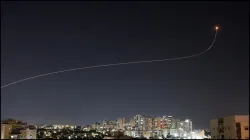Hezbollah launches airstrikes on sensitive Israeli military sites after Hamas' rocket attack fails
This came after Hamas launched two M90 rockets from Gaza towards Tel Aviv, one of which fell in the sea and the other failed to reach Israeli territory. Tensions in the Middle East have been high since the killings of Hamas leader Ismail Haniyeh and Hezbollah commander Fuad Shukr.

Israel-Hamas war: In a show of coordinated attacks by Iran-backed groups in the Middle East, Hezbollah on Tuesday said it launched a series of strikes against sensitive Israeli military sites, claiming that one of its missiles hit a group of Israeli troops near a site, moments after Hamas' M90 rocket attack on Tel Aviv failed to make an impact. In short statements, Hezbollah claimed it targeted the Israeli army’s technical and espionage equipment at the al-Samaqa, Ramia and Misgav Am sites, according to Iranian state media.
Hezbollah said its operations were conducted in support of the “steadfast Palestinian people in the Gaza Strip and in support of their brave and honourable resistance” and that one of its missile attacks hit a group of Israeli troops around an Israeli military site near the settlement of Matat. This came after Hamas launched two M90 rockets from Gaza towards Tel Aviv, one of which fell in the sea and the other failed to reach Israeli territory.
According to the IDF, a rocket fired from the Gaza Strip landed in the sea off the coast of central Israel. A second rocket failed to cross the border and fell short inside Gaza, according to the Army. "We have bombed the city of Tel Aviv and its suburbs with two 'M90' missiles in response to the Zionist massacres against civilians and the deliberate displacement of our people," said Hamas' Al-Qassam Brigades in a statement on Tuesday. There were no reports of casualties in Israel.
This came after Israeli airstrikes killed 19 Palestinians in the central and southern Gaza Strip on Tuesday, medics said. One strike killed six people in Deir Al-Balah, including a mother and her twin four-day-old babies, while seven other Palestinians were killed in a strike on a house in the nearby Al-Bureij camp. Four people were killed in two separate strikes on the Al-Maghazi camp in the central Gaza Strip and Rafah in the south.
Hamas on ceasefire negotiations
Hamas has stuck to its demand that Gaza truce talks focus on a deal already discussed with Israel and mediators rather than starting anew, according to an official after the Tuesday strike. The US said on Monday that it expected peace talks slated for Thursday to go ahead as planned, and that a ceasefire agreement was still possible.
"Our statement the other day was clear: what is needed is the implementation, not more negotiation," said the Hamas official, who declined to be named owing to the sensitivity of the issue. A ceasefire deal would aim to end fighting in Gaza and ensure the release of Israeli hostages held in the enclave in return for many Palestinians jailed by Israel.
Hamas wants a deal to end the war while Israeli Prime Minister Benjamin Netanyahu says it can only end when Hamas is eradicated. These negotiations between the US, Qatar and Egypt have gone on for months with no end in sight, owing to crucial differences between Israel and Hamas.
Iran's anticipated attack on Israel
Meanwhile, Iran has vowed a severe response to Hamas chief Ismail Haniyeh's killing, which took place as he visited Tehran late last month and which it blamed on Israel. Three Iranian officials told Reuters that only a ceasefire deal in Gaza stemming from hoped-for talks this week would hold Iran back from direct retaliation.
One of the sources, a senior Iranian security official, said Iran, along with allies such as Hezbollah, would launch a direct attack if the Gaza talks fail or it perceives Israel is dragging out negotiations. The sources did not say how long Iran would allow for talks to progress before responding. Iran has been involved in intense dialogue with Western countries and the United States in recent days on ways to calibrate retaliation, the sources said.
(with Reuters inputs)
ALSO READ | Hamas attacks Israel, launches 'M90' rockets at Tel Aviv in major escalation of conflict

